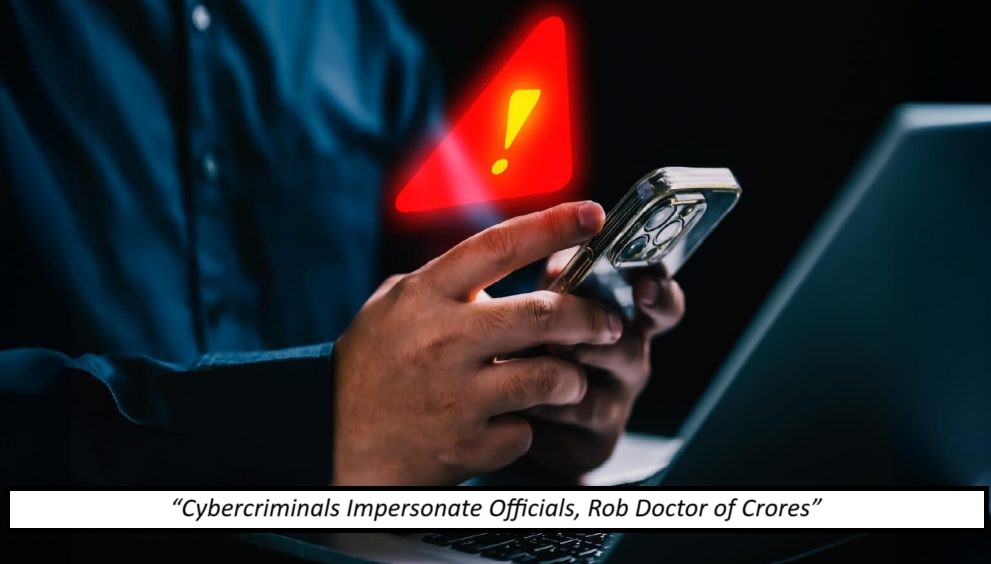Senior doctor blackmailed through fake video calls and forged legal documents in one of India’s biggest cyber fraud cases
🧠 What Happened? A Doctor’s Nightmare Begins
In a chilling case of cybercrime, a senior woman doctor from Gandhinagar, Gujarat, was defrauded of ₹19.4 crore over 102 days through a sinister scam known as ‘digital arrest’. The criminals tricked her into believing she was under investigation for serious financial crimes and forced her into constant contact over video calls while extorting her life savings.
📞 How the Fraud Started: A Multi-Layered Trap
According to the FIR, the scam began in March 2025, when the doctor received a phone call from a woman claiming to be Jyoti Vishwanath from the Telecom Department. This was followed by a series of calls from individuals posing as:
- Sub-Inspector Mohan Singh
- Public Prosecutors Deepak Saini and Venkateshwar
- Notary Officer Pawan Kumar
They falsely claimed her number was used for sending obscene content and money laundering, and convinced her to share her Aadhaar details. Using WhatsApp audio and video calls, the fraudsters staged a convincing legal investigation.
📄 Forged Documents & Fake Charges
To solidify their claims, they sent a forged notice on an Enforcement Directorate letterhead, falsely charging her under the Foreign Exchange Management Act (FEMA) and the Prevention of Money Laundering Act (PMLA).
Fearing legal action, the doctor complied with all instructions and remained in continuous video contact—even during her nephew’s wedding in Surat.
💰 The Extortion: How ₹19 Crore Was Siphoned Off
Between March 15 and June 25, the doctor was blackmailed into:
- Breaking fixed deposits
- Selling gold jewellery
- Taking out loans
- Liquidating mutual funds and shares
She was told her total assets (₹20 crore) needed to be “secured” in designated accounts for investigation. Over ₹19 crore was transferred to over 30 accounts, allegedly controlled by the fraudsters.
Only after months of being digitally imprisoned did she realise the truth and contact the police.
👮 Police Investigation & Arrests So Far
- One suspect arrested: Lalji Jayantibhai Baldaniya, whose account was used for fund transfers.
- More suspects under investigation by the CID Cyber Cell.
- Police are working to trace account holders and recover stolen funds.
🕵️ Statement from Police:
“This is a classic case of digital arrest. Victims are threatened with fake charges and asked to transfer funds under the pretext of investigation,” said Dharmendra Sharma, SP, CID Cyber Cell.
🌏 Cambodia Cyber Crime Link Emerges
Investigators have found a possible link to Cambodian cybercrime syndicates, which operate fake call centers targeting Indians. These gangs have reportedly been responsible for over ₹1,000 crore in monthly losses, as per a recent Ministry of Home Affairs report.
❓ What is ‘Digital Arrest’?
‘Digital arrest’ or ‘virtual arrest’ is a form of cyber-extortion where criminals impersonate law enforcement officials. Victims are:
- Accused of criminal activity (pornography, drug trafficking, or money laundering)
- Told they are under surveillance and must stay on video/audio call
- Pressured to send money to “verify” their identity
- Warned not to speak to family or police
⚠️ Authorities Say:
There is no such thing as a digital arrest. Victims are advised to disconnect immediately, verify identities, and report such calls to cybercrime portals.
👵 Why Are Elderly Citizens Targeted?
- Many senior citizens are unfamiliar with cyber threats.
- They are more likely to panic under pressure from “officials”.
- Fraudsters use fear, urgency, and false authority to coerce compliance.
✅ How to Stay Safe: Cybercrime Prevention Tips
- Never share Aadhaar or personal documents over phone or WhatsApp.
- Do not stay on long video calls with unknown callers.
- Verify any enforcement notice through official government websites.
- Consult family or legal advisors before transferring large amounts.
- Report fraud immediately at https://cybercrime.gov.in or dial 1930.



